Our patient speakers at the Amyloidosis Speakers Bureau are powerful educators and offer compelling insights. Have a listen to this brief clip from Greg with his call out to those of West African descent — BE AWARE there is a high prevalence believed to be carriers of hereditary amyloidosis.
Slider
Expert Insights: Amyloidosis – A Brief Clinical Overview
Dr. Sarah S. Lee, Assistant Professor, Division of Hematology, at the City of Hope, provides a brief yet comprehensive clinical overview of amyloidosis. In this video Dr. Lee discusses the breadth of amyloidosis, the wide range of symptom presentations, and which organs are typically involved. Focusing on AL (light chain) and TTR (transthyretin) types, she then goes through a diagnostic workup to arrive at a diagnosis, stressing the importance of typing once the presence of amyloid has been confirmed. Concluding her overview, Dr. Lee describes treatments available and how they impact patient prognosis and quality of life.
Cardiac Amyloidosis – AL and ATTR: Two Different Conditions
Dr. Mazen Hanna, cardiologist at the Cleveland Clinic and co-director of the Amyloid Program, explains how cardiac amyloidosis can originate from two very different types of amyloidosis: AL or ATTR. Dr. Hanna illustrates how physicians can identify cardiac amyloidosis and look to different diagnostic work-ups to understand whether the issues are due to AL or ATTR amyloidosis. These two conditions are treated differently and have different prognoses, emphasizing the importance of understanding the type of amyloidosis involved.
Expert Insights: The Future for Patients with Transthyretin Cardiac Amyloidosis is Looking Brighter
The treatment for patients with Transthyretin Cardiac Amyloidosis has advanced significantly since 2018 when there were no FDA-approved therapies. In this presentation, Dr. Mat Maurer from Columbia University shares how diagnostic imaging techniques have significantly improved, thereby reducing the need for an invasive heart biopsy. In addition, he shares fascinating statistics on how the age and stage of diagnosis has been evolving. Based on today’s clinical trials, providers are optimistic that the expansion of options for patient care will continue.
The future is indeed looking brighter.
Diagnosing Amyloidosis: A Two-Step Process

Amyloidosis can present in many types with the three most prevalent being light chain (AL) amyloidosis, hereditary variant transthyretin (ATTRv) amyloidosis, and wild type transthyretin (ATTRwt) amyloidosis. Being a rare disease, diagnosis can be particularly challenging, given that the general medical community is not well educated on the malady and symptoms are often associated with other more common ailments.
Successfully diagnosing the disease requires a two-step process before an appropriate treatment program can be determined and implemented for each patient.
- First, if amyloidosis is suspected, testing must be done to confirm the presence of amyloid.
- Second, once the presence of amyloid is confirmed, testing must then be done to identify and confirm the type of amyloidosis.
It is crucial that the second step, where the correct type of amyloidosis is identified, as the treatment regime can be different for each type. Here we share two different patient experiences which illustrate successful execution of the two-step diagnostic process.
Patient Case #1
The first case involved a 23-year old female. In 2017 she experienced an episode of coughing up blood, after which she looked in her throat with a flashlight and discovered a sizable lump. The patient met with a local ENT, who incorrectly diagnosed allergies, and prescribed over-the-counter medicine. With no improvement, she met with a second ENT. Testing was performed on the patient’s left oral pharynx utilizing a Congo red staining biopsy process which confirmed the presence of amyloid in the tissue. Additionally, mass spectrometry was performed which successfully differentiated the type of amyloidosis as being ALH (lambda light chain and delta heavy chain). Subsequently, she was referred to a hematologist who ordered a bone marrow biopsy and blood testing. The bone marrow biopsy summary notes read “….in conjunction with the concurrent finding of monoclonal lambda light chain restricted plasma cells in the marrow by flow cytometry, the findings are consistent with involvement of the marrow by a plasma cell neoplasm.”
Additionally, the blood testing confirmed elevated light chains as shown below.
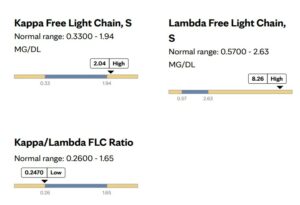
Patient Case #2
The second case involved a man in his mid-fifties. He began experiencing disease symptoms approximately 6-7 years prior to being diagnosed in early 2019. He initially experienced gradually progressing numbness in his feet, legs, hands and forearms, as well as bilateral carpal tunnel syndrome. Soon after, he began experiencing symptoms of lightheadedness and fainting. Additionally, he started experiencing progressive gastro-intestinal issues such as acid reflux, chronic coughing, and frequent bouts of constipation and diarrhea. By 2018, his physical condition was rapidly deteriorating, including a total weight loss of approximately 80 pounds. During this extended period of time he was seen by a variety of physicians including internal medicine, neurology, endocrinology, gastroenterology, oncology, and cardiology, none of who were successful in arriving at a conclusive diagnosis. His list of maladies included cardiomyopathy, peripheral neuropathy, autonomic neuropathy, bilateral carpal tunnel syndrome, and gastroparesis, all which are classic symptoms of amyloidosis.
Finally, in early 2019 his condition was successfully diagnosed by an amyloidosis specialist. An echocardiogram was performed as well as a cardiac MRI (utilizing a gadolinium tracer) to identify amyloid fibrils and related damage in the heart tissue. These tests confirmed the presence of amyloid. A free light chain serum test was performed which ruled out AL amyloidosis, and Transthyretin DNA sequencing was performed to differentiate between the hereditary variant and wild-type of ATTR, which identified the T80A (legacy T60A) variant of transthyretin (ATTRv) amyloidosis. The two tests were successful in identifying the type of amyloidosis. The associated testing results are show below.
Echocardiogram Summary Notes
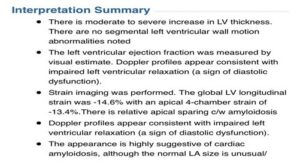
Associated Cardiac MRI Interpretation
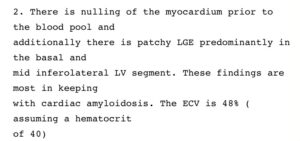
DNA Sequencing Result
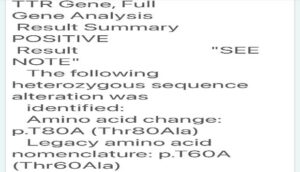
Once Diagnosed, Next is a Treatment Plan
Once the presence of amyloid is confirmed, and the type is identified, then it is time to treat the disease. In each of these patient cases the disease was diagnosed utilizing the two-step process to identify and confirm the type of amyloidosis. In both cases, successful treatment regimens were implemented which were effective in putting the disease into remission and/or halting disease progression.
Treatment options for amyloidosis have been vastly improved over the past several years. What was previously considered to be a foregone fatal disease can now be a manageable chronic disease. To ensure the best patient outcome, a timely diagnosis utilizing the two-step process, is essential.
Expert Insights: Unraveling the Lineage: The Genetic Basis of Familial ATTR Cardiomyopathy
Dr. Witteles, a cardiologist and co-director of the Stanford Amyloid Center, discusses genetic testing, sequencing the TTR gene, and clarifies the confusing mutation nomenclature. He details the most common of the more than 145 known hereditary mutations, the prevalence of cardiomyopathy versus neuropathy, and references studies around diagnostic factors.
Expert Insights: Neurological Complications of ATTR Amyloidosis
Patients with ATTR amyloidosis are commonly faced with neurological complications. In this presentation, Dr. Chafic Karam from the University of Pennsylvania goes through four areas: an overview of the neurological systems, how amyloid damages the nerves, neurological signs of ATTR amyloidosis, and how to detect amyloid and diagnose ATTR amyloid neuropathy.
A Patient Guide for Understanding Amyloidosis

Amyloidosis is a multi-system disease, making diagnosis challenging. In this informative patient guide, the American Society of Nuclear Cardiology (ASNC) discusses common symptoms, types of amyloidosis, red flags to be aware of, diagnostic tests and available treatment options.
CLICK HERE to read/download ASNC’s Guide for Understanding Amyloidosis
Multidisciplinary Care for Cardiac Amyloidosis Patients

Multi-systemic diseases such as amyloidosis are complex to diagnose, but also complex in treatment and ongoing patient care. It takes a village. In this seminal piece, the American College of Cardiology (ACC) provides an Expert Consensus Decision Pathway on Comprehensive Multidisciplinary Care for the Patient With Cardiac Amyloidosis.
According to Dr. Vaishali Sanchorawala, Director of the Amyloidosis Center at Boston Medical Center, “The results and progress in the therapeutic landscape of systemic amyloidosis are unbelievable, unprecedented and unheard of for this uniformly fatal disease of the 1990s. But they are not enough, and therefore we need to work together to make a difference.”
This paper is an absolute must-read for cardiologists and other specialties such as neurology, gastroenterology, nephrology and hematology.
To read, CLICK HERE.
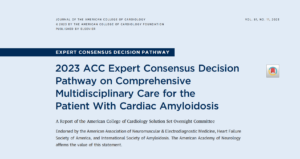
Thank you.
————————————————————
Source:
Kittleson M, Ruberg F, et al. 2023 ACC Expert Consensus Decision Pathway on Comprehensive Multidisciplinary Care for the Patient With Cardiac Amyloidosis. J Am Coll Cardiol. 2023 Mar, 81 (11) 1076–1126.
https://www.jacc.org/doi/10.1016/j.jacc.2022.11.022
Hereditary Amyloidosis: The V122I Variant
Hereditary Amyloidosis in Black Americans of African Descent: ATTR V122I Variant
Amyloidosis, still considered a relatively rare disease, can take several forms. Each slightly different, but most sharing similar debilitating symptoms of cardiac and/or neurological impairment, or both. It is viewed by many experts that amyloidosis has been presenting in plain sight and missed, or wildly underdiagnosed, for decades and, in some cases, generations. Thankfully, education to raise awareness within the healthcare community, along with improvements in diagnostic tools and testing, the journey to diagnosis and treatment is becoming more visible.
The hereditary transthyretin amyloidosis (hATTR) type results from a genetic mutation of a protein, transthyretin, which is produced in the liver and circulates throughout the body. The mutation causes the TTR protein to misfold, becoming unstable and depositing in organs and nerve systems causing impairment and eventual organ failure. Common symptoms for the disease include bilateral carpel tunnel syndrome, muscle weakness, cardiomyopathy, polyneuropathy, GI issues especially chronic diarrhea and constipation, and both nuisance and serious concerns and if untreated can lead to death. Early diagnosis, genetic testing to identify the exact genetic mutation, and treatment are important to slow the progression of the disease and conserve quality of life.
SIGNIFICANTLY UNDER-DIAGNOSED
Considered a rare disease, advances in diagnosis have shown that it is less rare than originally thought.
Familial amyloidosis caused by a transthyretin mutation occurs in approximately 1 in 100,000 Caucasians in the U.S, and more commonly in African Americans (approximately 4% in that population). This condition is prevalent in Portugal, Sweden, Japan, Ireland, Spain, France, Finland, Germany and Greece. Symptoms usually begin between 40 and 65 years of age.
https://rarediseases.org/rare-diseases/amyloidosis/
To date over one hundred variants of TTR have been identified as causing ATTR amyloidosis and they are distributed worldwide with concentrations in various ethnic populations. One variant, V122I is most commonly found in people with African and especially West African ancestry. It has been distributed worldwide but especially in North America and the Caribbean through historic slave trade and the migration of populations. This variant is most often associated with ATTR-CM (Amyloidosis with cardiomyopathy) and heart failure.
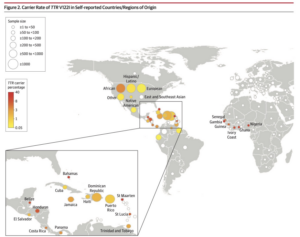
Worldwide Carrier Rates of TTR V122I in Self-Reported Countries/Regions
From Multicenter Study JAMA 2019 Dec 10;322(22):2191-2202.
doi: 10.1001/jama.2019.17935.
In an article by J. Buxdaum and F. Ruberg in the Journal Genetics in Medicine January 2017, the authors stated the following findings.
Since the identification of a valine-to-isoleucine substitution at position 122 (TTR V122I; pV142I) in the transthyretin (TTR)-derived fibrils extracted from the heart of a patient with late-onset cardiac amyloidosis, it has become clear that the amyloidogenic mutation and the disease occur almost exclusively in individuals of identifiable African descent. In the United States, the amyloidogenic allele frequency is 0.0173 and is carried by 3.5% of community-dwelling African Americans. Genotyping across Africa indicates that the origin of the allele is in the West African countries that were the major source of the slave trade to North America. At autopsy, the allele was found to be associated with cardiac TTR amyloid deposition in all the carriers after age 65 years; however, the clinical penetrance varies, resulting in substantial heart disease in some carriers and few symptoms in others. The allele has been found in 10% of African Americans older than age 65 with severe congestive heart failure. At this time there are potential forms of therapy in clinical trials. The combination of a highly accurate genetic test and the potential for specific therapy demands a greater awareness of this autosomal dominant, age-dependent cardiac disease in the cardiology community.
Genet Med advance online publication 19 January 2017
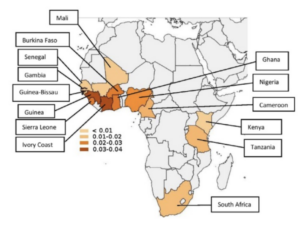
The prevalence and distribution of the amyloidogenic transthyretin (TTR) V122I allele in Africa.
1:CAS:528:DC%2BC28XhsFSlsbfJ 10.1002/mgg3.231 Mol Genet Genomic Med. 2016; 4: 548-556
Dr. Martha Grogan, director of the Cardiac Amyloid Clinic of Mayo Clinic in Rochester, Minnesota commented in an interview published in the Mayo News Network (https://newsnetwork.mayoclinic.org/discussion/expert-alert-cardiac-amyloidosis-masquerades-as-other-conditions-1-type-affects-more-black-americans/) that amyloidosis can be tricky to suspect because symptoms may not be initially present and they may mimic other more common diseases. Currently there are options for free saliva or blood tests through several pharmaceutical companies. To determine the type of the disease genetic testing is important.
The University of Pennsylvania and the Icahn School of Medicine at Mount Sinai conducted a study of 52,492 participants of which 11,143 were of self-reported African ancestry. https://jamanetwork.com/journals/jama/fullarticle/2757227
An excellent discussion of the results emphasizes the conclusion that a significant association of TTR V122I and heart failure in the tested population, primarily in those of West African ancestry, exists. In addition, they confirm previous studies that have suggested a high rate of underdiagnosis of hATTR-CM in cases of cardiomyopathy and heart failure in elderly patients of African Ancestry. The discussion further suggests that this is likely due to lack of information and familiarity with the disease in the medical community.
CITATION: Damrauer SM, Chaudhary K, Cho JH, et al. Association of the V122I Hereditary Transthyretin Amyloidosis Genetic Variant With Heart Failure Among Individuals of African or Hispanic/Latino Ancestry. JAMA. 2019;322(22):2191–2202. doi:10.1001/jama.2019.17935. https://pubmed.ncbi.nlm.nih.gov/31821430/
Discussion of a different study of 7,514 African American participants in the US considered the question of the association between genetic variation and the risk of heart failure. This study was conducted by the University of Alabama, University of Colorado, Columbia University, and Cornel University. The results are similar to those in the University of Pennsylvania study discussed above, with additional comments that more subtle symptoms and changes may be apparent well before the typical onset of significant disease, average age 65, and the need for earlier screening for early detection and treatment.
An autosomal-dominant disease, hATTR-CM has a median survival of nearly 2.5 years without treatment after receiving a diagnosis.34,35 Extrapolating the hATTR-CM–associated Val122Ile variant frequency to the population level suggests that approximately 1.4 million Black individuals carry this variant implicated in the development of heart failure and reduced overall survival. Despite the possible clinical implications, the Val122Ile TTR variant, which is seen relatively more commonly among individuals of African ancestry, is not included in the list of clinically actionable deleterious variants compiled by the American College of Medical Genetics and Genomics.9 Thus, this potentially deleterious variant may not be reported as clinically actionable, thereby reducing physician vigilance for hATTR-CM.
Findings In this retrospective cohort study that included 7,514 Black participants in the US with a median 11.1 years of follow-up, the incidence of heart failure was 15.6 per 1000 person-years among Val122Ile variant carriers compared with 7.2 per 1000 person-years among noncarriers, with an adjusted hazard ratio of 2.43.
Meaning Being a carrier of the Val122Ile variant was significantly associated with an increased risk of heart failure among Black individuals living in the US.
CITATION: Parcha V, Malla G, Irvin MR, et al. Association of Transthyretin Val122Ile Variant With Incident Heart Failure Among Black Individuals. JAMA. 2022;327(14):1368–1378. doi:10.1001/jama.2022.2896
SUMMARY
Despite the evidence that a meaningful 3-4% of the US Black population of West African ancestry likely carries the V122I genetic mutation, hereditary TTR amyloidosis remains significantly underdiagnosed and undertreated in this population.
Cardiac symptoms in elderly black patients have too often been treated for more common cardiomyopathy and heart conditions, resulting in lack of appropriate treatment and often death. Because of lack of awareness in the medical community and reduced access to expert medical care, more subtle symptoms in younger black patients generally have not caused the physicians to consider amyloidosis. Additionally, lack of genetic testing can mean that entire families are unaware of the implications of the disease.
Amyloidosis can be devastating to both patients and their families. Increased awareness of the disease, availability of testing, and FDA-approved therapies are slowly beginning to shift this dynamic. However, there is still much work to be done to close the gap between diagnosed cases and the population estimated to be affected.
Early diagnosis is key.
For additional information regarding hereditary amyloidosis: